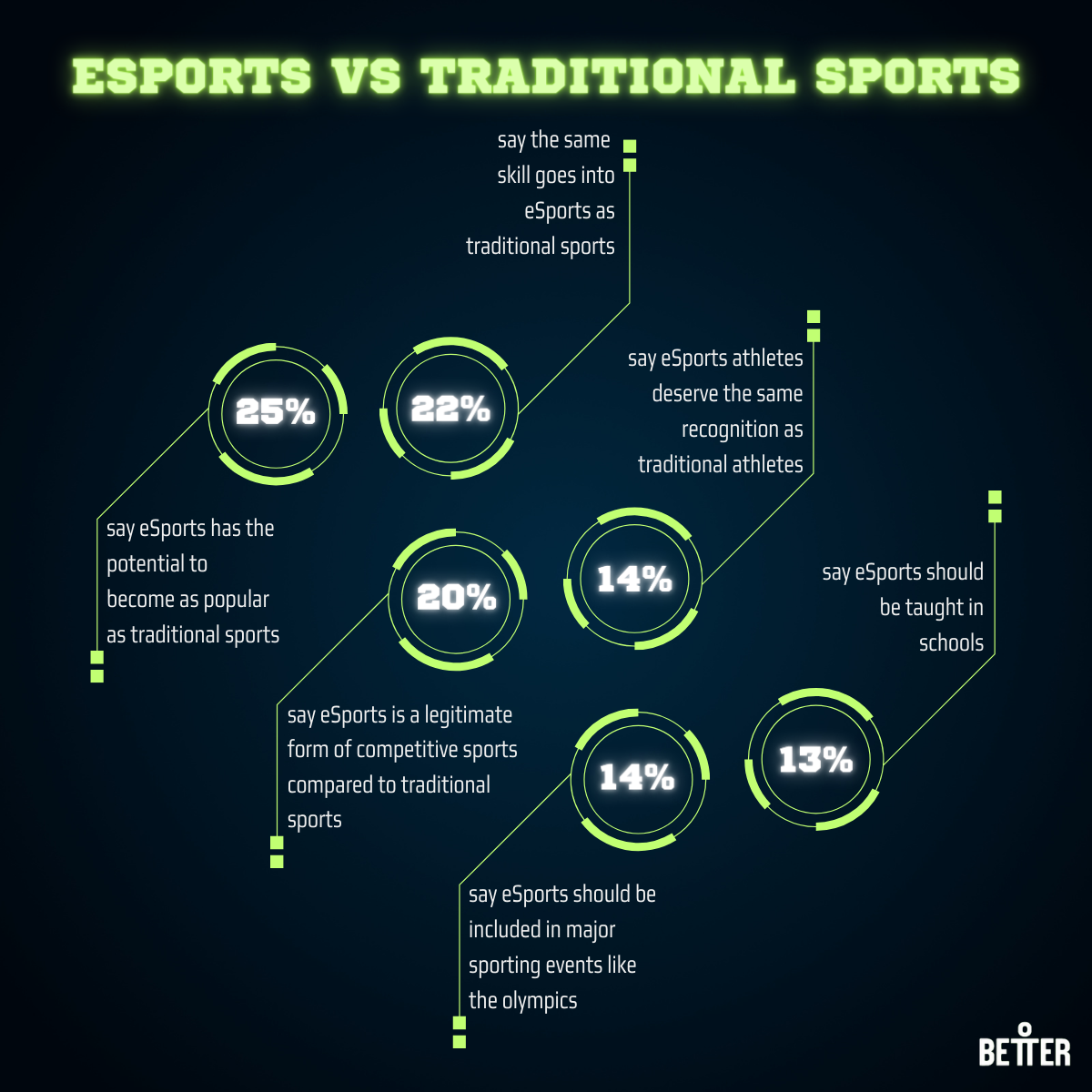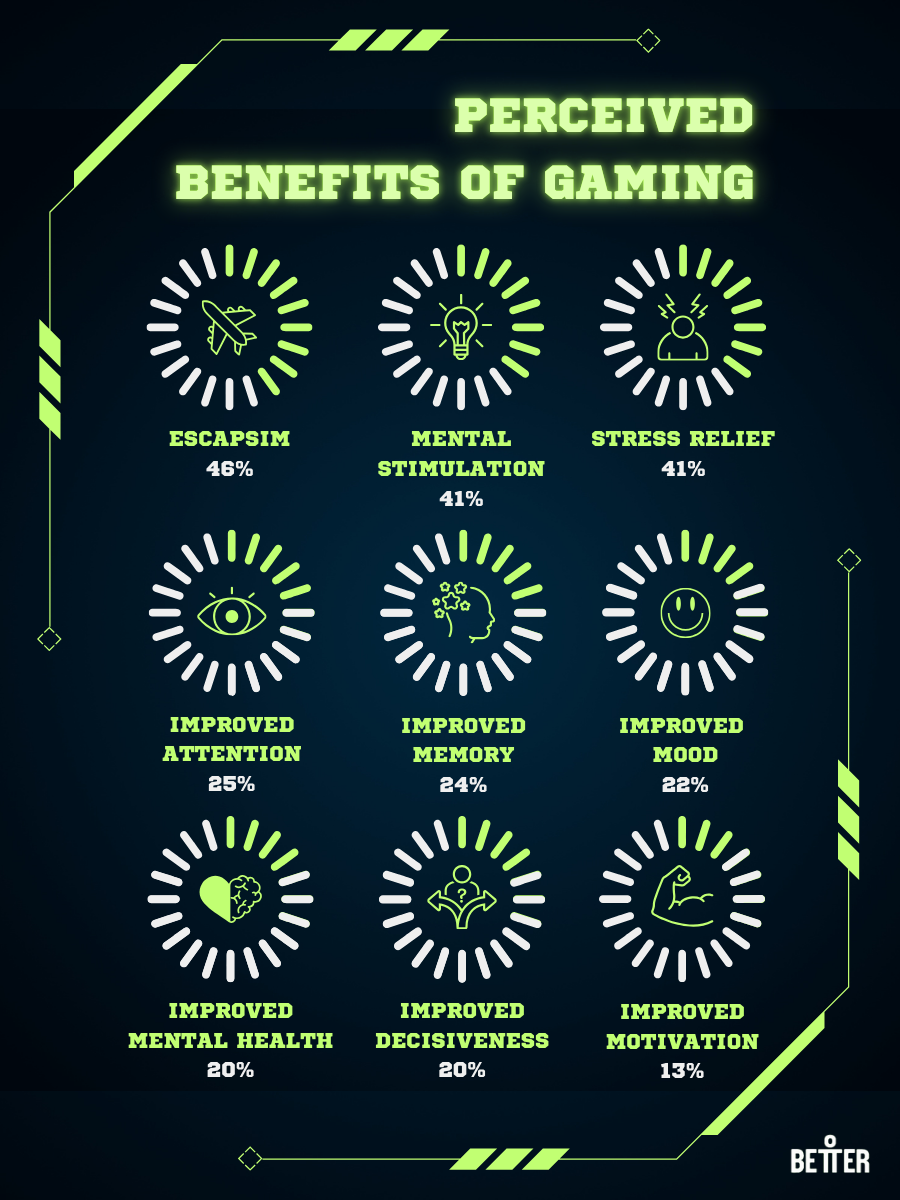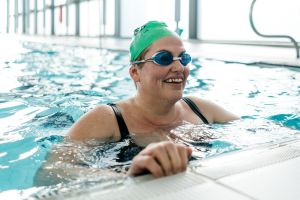Healthy Gamers: Tackling Esport Health Stereotypes
Gaming on the latest consoles and playing inspiring, creative, and adventurous new games has seen the industry expand to a multi-billion pound empire, fueling endless entertainment for millions, but the stereotypical image of gamers is perhaps not as flattering.
The image of isolated, sedentary individuals glued to their screens for hours on end is a common one used to portray gamers who live solitary and unhealthy lifestyles, but the truth about many gamers and their lives may just surprise you. In fact, Esports professionals - gamers at the very top of their field - need to be highly dedicated, skilled, and on top of their physical and mental agility to compete for the huge prizes on offer.
We spoke to over 2,000 people in the UK who said they were aware of Esports and gaming, including almost 1,000 gamers, and surveyed them on their perceptions of what a gamer is, how they think they compare to professional athletes, and how they think gamers compare to the rest of the UK when it comes to everyday health habits, as we seek to challenge the stereotypical view of a modern day gamer.
How Esports Compares to Traditional Sports
According to our research, just one in five people think Esports is a legitimate form of competitive sport compared to the likes of football and rugby. Indeed, 86% of people in the UK don’t think Esports athletes deserve the same recognition and respect as traditional athletes, and almost 9 in 10 think that Esports should not be included in other major sporting events such as the Olympics. Clearly, these numbers don’t look positive for those in the Esports field, but a quarter of Brits do believe that Esports does have the potential to reach the heights of popularity of traditional sports in time, suggesting a gradual acceptance in the rise of gaming as a sport at some point in the future.
There have already been significant gains in popularity worldwide, with worldwide market revenue expected to reach over 1.8 billion dollars by 2025 and the revenue of the Esports industry in the UK rising by 179% since 2017. Twitchtracker, a platform tracking the data of a popular game streaming site, also shows how 893 billion minutes of streaming have been watched, with an average of 2,439,000 viewers watching streams concurrently.
We spoke to the College of Esports (CoEs), which offers innovative and practice-focused Degrees in a range of international Esports business areas. Nathan David, Head of Foundation & Events Course Leader said: “If you speak to any performance athlete, they will tell you that despite the physical aspect of sport and competition being key, the mental and psychological factors are just as important; dealing with stress and performing under pressure are two parallels often referred to.
“I think you will see an attitude change in the perception of Esports over the next 5 to 10 years or so as misconceptions and further understanding of our industry is addressed.”

Proving gaming misconceptions wrong
We also asked people what profession they would most like their children to be a part of, with lawyers (40%), healthcare workers (35%), and professional sports athletes (27%) coming in the top three places, with a career in Esports and gamers (19%) among the least popular, and only social media influencers (13%) scoring lower.
This may be due to a lack of awareness as to what an Esports career involves, including how much it pays. Our study tested people’s knowledge on several questions, including how much people would estimate the top Esports player has earned. Just 6% of people correctly guessed that the highest earner has made a total of over £5 million, with Johan Sundstein, a Danish Esports gamer, making over £5.7 million over his Esports career.
According to Esports Earnings, a total of $1,643,972,293.49 in prize money has been recorded across over 60,000 tournaments, 130,000 players, and 648 different games, highlighting the huge numbers involved in the field that most people in the UK are unaware of.
Something else the vast majority are unaware of is the gender split when it comes to male and female Esports gamers. The stereotype suggests the majority of gamers would be young men, and in our test of the UK, we found that 95% of people got the gender split completely wrong. In fact, the distribution of video game users in the UK stands at 47% female and 53% male, but just 5% of respondents guessed that correctly.
Additionally, many would consider gamers to be glued to a screen all day, when in fact, Fabian Broich, the Head of Performance at the British Esports brand EXCEL, broke down a weekly routine for his Esports stars, with the guide potentially exceeding 300 minutes of activity every week. This includes stretching, resistance training, and cardio work in order to “help reduce stress levels and improve general well-being among the players.”
Again, according to our study, just 5% of respondents correctly guessed the activity levels of Esports gamers, with almost 40% of people guessing they would do anywhere from zero to 90 minutes of physical activity each week.
Professor Philip Wilson, Chair of the Board at the College of Esports said: “At CoEs we always promote a healthy, balanced lifestyle that includes promoting your wellbeing socially, mentally, and physically.
“It is undeniable that gaming is almost entirely sedentary, but it is achievable to still be physically and mentally healthy despite playing games. Good sleep/recovery, a balanced diet, and physical activity are necessary in all forms of life, including for esports players or gamers.”
The Health and Fitness of Gamers
Aside from physical activity, other areas we wanted to explore were the sleeping habits of gamers versus the rest of the UK, as well as how long gamers spend outdoors in comparison to others. Due to the nature of gaming, it is typically thought that gamers get less sleep and don’t see much outside of their gaming chair and screen setup.
However, according to our study, gamers on average get 6.27 hours of sleep each night compared to non gamers who get 6.47 hours, which is the equivalent of just 12 minutes of difference.
Furthermore, gamers were found to spend more time in the great outdoors than non gamers. Those who love their consoles said they spent 1 hour, 23 minutes outside each day, compared to the average of 1 hour, 18 minutes for non-gamers.
So while gamers get a bad reputation for being locked away for many hours, making up for their late nights of gaming with lots more sleep, the opposite is in fact true, and they lead very similar lives when it comes to sleep and outdoor activity to the rest of the population. In fact, gaming has a number of benefits, with 90% of the UK asserting at least one positive element of gaming, including improvement in attention (25%), better mental health (19%), decision making (20%), improvements in memory (24%), mood (22%), stress relief (41%), mental stimulation (41%), and escapism (46%).

Molly Sharp, a student at the CoEs said: “Gaming has been an absolute saviour in regards to my mental health. As someone who often felt outcast in school and struggled with severe anxiety and mental health problems, meeting people online who not only share the same passions as you but also often have similar issues creates almost a haven for those who struggle socially.”
In Summary
As we can see, the image of gamers as unhealthy, sedentary individuals does not align with the reality we uncovered through our research. The gaming community is diverse, dedicated, and evolving, and as awareness increases, we should be able to see the more positive aspects of this rapidly growing industry. As we challenge these stereotypes and embrace the potential of Esports, we may even witness a future where it gains the same recognition and respect as traditional sports. Gaming is not just a pastime; it's a thriving culture with numerous benefits that deserve our attention and understanding.
Methodology
Using a wide-ranging survey of 2,029 respondents, Better gathered data regarding the attitudes of people towards eSports and gaming. To ensure the survey is representative of the UK, respondents are from all regions, all genders, and above the age of 18.
The numbers are based on the population of the UK, age 16 and above.











